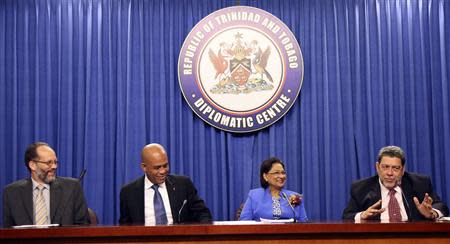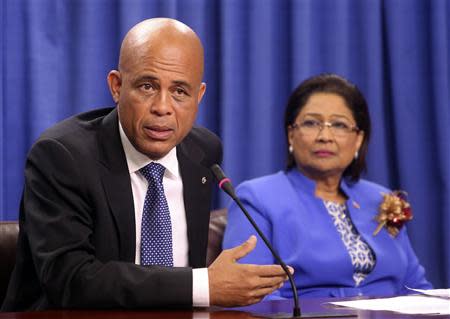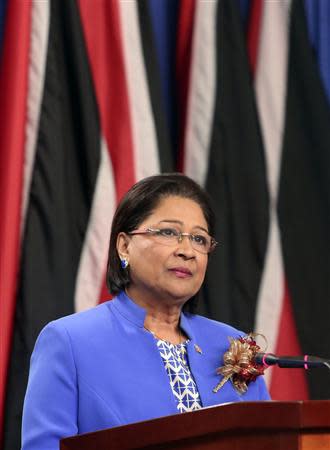Caribbean leaders consider sanctions on Dominican immigration ruling
By Linda Hutchinson-Jafar PORT OF SPAIN (Reuters) - Caribbean heads of state meeting in Trinidad and Tobago agreed on Tuesday to defer an application from the Dominican Republic for membership in CARICOM, the region's largest cooperation group, until Santo Domingo addresses a high court ruling denying citizenship to thousands of Haitian descendants. Trinidad and Tobago's Prime Minister Kamla Persad-Bissessar who chaired the meeting said the controversial September 23 ruling by the Dominican Constitutional Court had created "grave humanitarian situation" that left those affected stateless and with no recourse to appeal. The leaders of CARICOM, a 15-member organization of mostly English-speaking Caribbean nations, called on the Dominican Republic to take immediate steps to redress the situation and asked countries in the region to urge Santo Domingo to "right this terrible wrong." Persad-Bissessar said the meeting attended by Haitian President Michel Martelly also discussed suspending the Dominican Republic's membership in the CARIFORUM group, which is part of CARICOM and coordinates policy cooperation and regional integration. "We don't want to shoot all our guns. We'll keep that option for another day," she told reporters after a four-hour long meeting. The Dominican government is facing international pressure over the court ruling, with foreign leaders, U.N. agencies, human rights groups and Dominicans in the United States questioning its legal basis. The CARICOM meeting came amid rising border tensions after more than 200 Haitians were repatriated by Dominican authorities over the weekend following violence in the southwestern Dominican town of Neiba when an elderly couple was fatally stabbed during a robbery. Local residents retaliated by killing a 25-year-old Haitian man, Dominican officials said. Haiti and the Dominican Republic are engaged in talks aimed at resolving the thorny immigration dispute triggered by the Dominican court ruling. On Tuesday the Dominican government announced it was setting up "a special naturalization process" for the children of undocumented foreigners born in the Dominican Republic. But it remained unclear what the conditions of eligibility for citizenship would be. The court ruling retroactively denied Dominican nationality to anyone born after 1929 who does not have at least one parent of Dominican blood, citing a constitutional clause declaring all others to be in the country illegally or "in transit." The Dominican Republic has long complained of illegal migration of undocumented workers from its impoverished neighbor, even as it benefits from a steady source of cheap labor. Most of those affected are the descendants of Haitians who moved to the Dominican Republic to work in the sugar cane fields. Many used a temporary worker's card issued by the former state sugar company as proof of their residence in order to register their offspring. The Dominican Republic's population of 10 million includes about 458,000 people of Haitian descent, many of whom lack proper documents, according to official figures. About 240,000 of those people of Haitian descent were born in the Dominican Republic. (Additional reporting by Manuel Jimenez in Santo Domingo; Editing by David Adams and Cynthia Osterman)




